News & Events in Belarus
Faraway countries, NATO intelligence plans, key task for security agencies in President’s Week
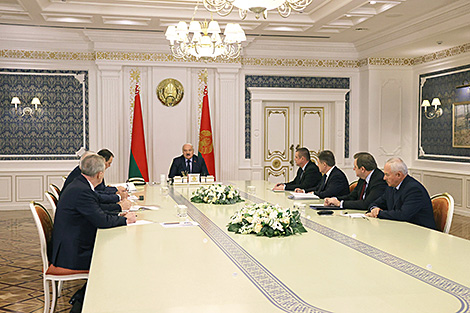
The work schedule of the Belarus president is always full of events. Aleksandr Lukashenko holds conferences and working meetings on the most topical matters concerning the country’s development, regularly visits the regions, goes on foreign trips and welcomes foreign guests, talks to reporters, signs decrees and laws. And even if there are no public events, it does not mean that the head of state does not work. It must be said that even when he relaxes, for instance, by playing ice hockey or chopping firewood, Aleksandr Lukashenko happens to find the time to give yet another instruction. All the decisions must be prompted by life, he likes to say.
The President’s Week project is intended for those, who want to keep up with the head of state, be up-to-date on the latest statements and decisions of the Belarusian leader.
Who will be responsible and for what in the course of realizing the agreements resulting from the latest foreign trips? China, UAE, African countries, India, and more than that are in the center of attention.
What did Aleksandr Lukashenko talk about with chiefs of security agencies of the CIS states? Why is their cooperation sometimes stronger than cooperation between diplomats? What do adversaries in NATO want and how can their plans be foiled? Reporters and ideologists, who fight on the frontline, activity of Western terrorist agents, support for allies, and the importance of conflict resolution in the latest episode of BelTA’s special project President’s Week.
REMOTE COUNTRIES. What tasks did the president formulate as a result of foreign trips?
Over the course of two weeks at the beginning of December Aleksandr Lukashenko made a number of trips to foreign countries. In early December he took part in a world climate action summit in the United Arab Emirates and held multiple meetings with foreign colleagues on the sidelines of the forum. After that the president visited China where he met with China President Xi Jinping. Upon returning to the UAE the Belarusian head of state met with UAE President, Sheikh Mohamed bin Zayed Al Nahyan. Then Aleksandr Lukashenko left the UAE and headed for Africa. An official two-day visit to Equatorial Guinea and a working visit to Kenya took place.
После этого Президент побывал Китае, где встретился с Председателем КНР Си Цзиньпином. По возвращении в ОАЭ глава белорусского государства встретился с Президентом этой страны шейхом Мухаммедом бен Заидом аль-Нахайяном. Из ОАЭ Александр Лукашенко направился в Африку. Состоялся официальный двухдневный визит в Экваториальную Гвинею и рабочий визит в Кению.
In turn, Prime Minister of Belarus Roman Golovchenko visited Uzbekistan and Vietnam in the same period. Negotiations and meetings at various levels took place.
Results of all these trips and other things were discussed at a government conference hosted by the head of state. The geography of visits stretched effectively from the Pacific Ocean to the Atlantic Ocean. “We have really painted this ‘far arc’ that we should work with,” noted Aleksandr Lukashenko.
The president explained that the “near arc” includes Belarus’ neighbors and partners from the CIS countries.
“Russia and the People’s Republic of China are two states, with which we have the most advanced relations. It is a different story. You know that the president’s decisions on each of these states have been adopted and are being implemented,” the Belarusian leader emphasized. “And the ‘far arc’ has been defined. The states that are of great interest to us are located to the north and to the south.”
Work with India
Aleksandr Lukashenko mentioned the advancement of cooperation with India although neither the president nor members of the government have visited this country recently.
“Work with the Indian state is another matter. We have been unable to come up with a fundamental solution. Back in the day the former foreign minister tried to come to grips with it,” the head of state noted.
He instructed incumbent Minister of Foreign Affairs Sergei Aleinik to put forward proposals on how to deal with these issues soon, no later than the first quarter of the next year. “I want to see a plan for work with India. Specifically a plan. Just like we did it in Africa with Equatorial Guinea. We don’t need tourist trips. We need solutions for concrete issues,” the head of state explained.
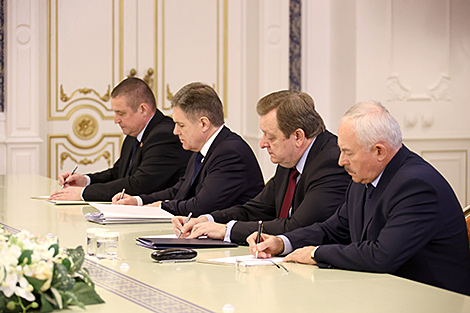
Control over the realization of agreements in Africa
“When it comes to Africa, I want to warn everyone. I have invited the vice premiers to this meeting, although they don’t know the details of these preparatory visits of our specialists and ministers. I have invited you to ask you to oversee the fulfillment of the arrangements reached during these business trips,” the president said.
Aleksandr Lukashenko noted that Belarus had approached work with Equatorial Guinea differently: “Everything proceeded under my strict control. The foreign minister came to this country to establish contacts. Specialists got down to work after that. When they visited this country prior to my visit, ministers outlined 15 main areas of our work and 74 specific projects that we have agreed to implement jointly with our friends in Equatorial Guinea. And they must be implemented. I absolutely insist on this and warn you.”
This is why the head of state instructed Presidential Aide Aleksandr Kosinets to oversee the work with Equatorial Guinea and Kenya in the Belarus President Administration. “You will be in charge. Note it down and oversee it. Study all the aspects of this matter. This work should be under control of the Belarus President Administration. I don’t want situations that occasionally happen when we have to revisit our relations with foreign partners, scrap something or add something. We have reached agreements and we need to implement these projects,” the Belarusian leader emphasized.
He noted that during his trip to Equatorial Guinea, he openly said that Belarus was not going to engage in any charity. “We are not the money-printing America. And not China that has a huge amount of reserves. And not even Russia. We should take care of our financial interests and work extremely conscientiously. We have very good prospects there. They need everything that we know how to make,” said Aleksandr Lukashenko.
Speaking about Kenya, the president addressed Viktor Sheiman: “I have already told you during the flight to get involved in African matters the way you used to do. You should oversee this matter as a special envoy of the president. Regarding Kenya, you know that their president asked us to help with three big things and we can benefit from helping them with these and other matters, too. Therefore, Africa, and Kenya in particular, is your area of responsibility. You were the one to get our foot in the door there. So you will be responsible for it now.”
A productive visit to China
As for the People’s Republic of China, First Deputy Prime Minister Nikolai Snopkov should be responsible for work with this country. Nikolai Snopkov attended the recent highest-level negotiations in Beijing together with the minister of foreign affairs.
Aleksandr Lukashenko called the visit to China very useful and productive. China is ready to work on the matters the parties discussed during the visit: “We didn’t hear a ‘no’ [during the negotiations]. Chinese President Xi Jinping was receptive to all our proposals saying that China was ready to work, advance cooperation, join efforts, and proceed in a friendly manner.”
“China is the future of the entire planet. The fact that we have good relations with it is our benefit, our accomplishment,” the head of state emphasized.
The United Arab Emirates
“As for the Emirates, they work with us on individual matters. There is no slowdown anywhere. We agreed that we may work together in Africa. They have a very big interest in it. Taking into consideration their influence in the world and their financial resources, they can do a lot there. Therefore, if they are interested in certain projects, they are welcome to join us,” said Aleksandr Lukashenko.
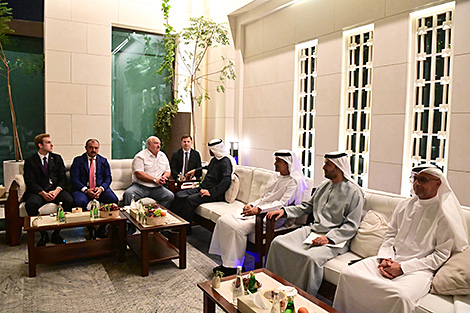
General tasks
The head of state encouraged all the participants of the meeting to work effectively, consistently and promptly to implement the agreements reached with various countries. To do this, it is important to work as a team. “Everything should be concentrated in the Ministry of Foreign Affairs. Everything should be there. Let's see how the new foreign minister will deal with these issues. There are a huge number of issues. This is why I want both Sheiman and Kosinets to get involved and so on. The government and ministers will have to implement all agreements. I warn you against any slowdown,” said the Belarusian leader.
TO STAY IN TOUCH. Why does Aleksandr Lukashenko want CIS security agencies work extra hard?
The 19th session of the conference of heads of security bodies and intelligence services of the CIS states took place in Minsk the past week. Belarus President Aleksandr Lukashenko met with participants of the conference in the Palace of Independence on 14 December.
He said it is symbolic that Belarus was hosting this meeting in the era of wars and political cataclysms: “Despite the political pressure and the pressure of sanctions from the West, primarily the United States of America, we continue to develop a peaceful stable state (we do everything for this) based on the principles of social justice. There is a great demand for justice in our states now.”
Aleksandr Lukashenko stated that the situation around the country is not getting safer. Tensions are growing in various regions of the planet. Some simmering conflicts are turning hot, and hybrid proxy wars are being unleashed everywhere.
According to the president, cooperation between security agencies helps better understand each other’s interests, take them into account and take specific measures to de-escalate the situation. “We need to assist each other where it is necessary. This is very important. We will act only this way,” Aleksandr Lukashenko assured.
Degradation of international bodies
The president noted the complete degradation of a number of international structures - from the OSCE and the Organization for the Prohibition of Chemical Weapons to the International Organization of the Red Cross.
“They have turned into demagogy platforms and tools for serving the interests of global players. We spend huge amounts of money on various kinds of conferences while understanding that they will produce noting. The latest one took place in Dubai. It reached the point of absurdity. The European Peace Facility allocates funds for the war in Ukraine,” the head of state said.
BelTA reported earlier that Aleksandr Lukashenko made a speech during the plenary session of the world climate action summit in Dubai on 1 December. He urged participants of the summit to make a real contribution to the resolution of the discussed problems. “It is possible that we have once again gathered here and will once again express our concern, unfortunately. Everyone will forget it in a week,” the head of state said. “Those, who spoke here first, those, who ‘care for the grandchildren’, are waging these wars. And wars greatly pollute the planet. Let’s stop it. This is why the most important thing is for us to learn how to speak less and do more.”
The role of security agencies
Taking into account chaos and the destruction of the international system of checks and balances, Aleksandr Lukashenko drew attention to the point of view of Kazakhstan’s first president Nursultan Nazarbayev, who had recently said that the world has never been this close to a nuclear war. “Who should we trust if not him? In such conditions special services are coming to play a bigger role. Their most important task is to protect their states and citizens from internal and external threats,” the head of state said.
Aleksandr Lukashenko remarked that his words about the growing role are not some banality. “The thing is that the ability of government agencies and ministries of foreign affairs to establish contacts has degraded a bit. And most importantly the ability to stay in touch in the most complicated circumstances. Security agencies know how to do it. You have to work extra hard in order to stay in touch, to keep communication channels open. Once this connection between you breaks, you will have no one to talk to,” he said.
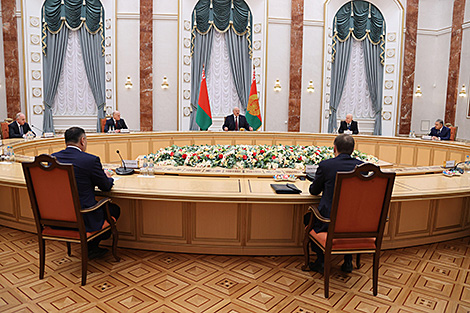
The main task of the NATO intelligence community
The president emphasized the importance of effective work of intelligence services to obtain reliable, relevant and, above all, predictive information that would allow country leaders to make balanced decisions in the interests of their people. “The main thing here is to one-up our opponents, to thwart the scenarios they are trying to force upon us. As I have been told (you may have different information), one of the main tasks of the NATO intelligence community and their allies is the disintegration of the post-Soviet space. They want to drive a wedge in our centuries-old good neighborly relations, and then set us against each other. We’ve seen it before,” the Belarusian leader said.
“I am sure that if it is no longer possible to reach each of you by phone to resolve a specific issue, this will also turn into a tragedy. We should not let this happen. This is why I urge you to never break your connections. Even if some of our states have a different point of view on the policy some country pursues today. Not to hurry is the key thing,” added Aleksandr Lukashenko.
Reporters and ideologists on the frontline
The head of state also sees serious threats that have taken shape in the mass media field. “Today our journalists and ideologists are on the front line. They are waging this information war. It is very important to prevent this information war from escalating into a hot war,” said Aleksandr Lukashenko.
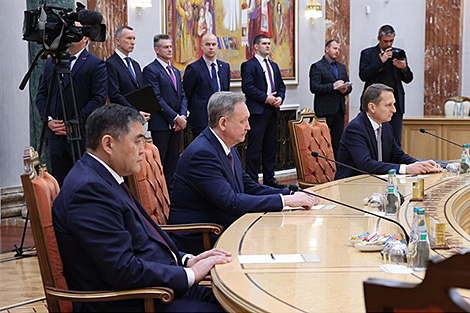
He noted that opponents are trying to put pressure on the population using destructive methods, carry out cyber attacks against the critical infrastructure of government agencies, and spread fake news and hoaxes.
Importance of economy
Aleksandr Lukashenko urged the parties to prevent infighting in the Commonwealth of Independent States: “We have lost our state that helped prop up the multipolar world. We are not as strong today as we used to be. Therefore, it is very difficult for us to resist these fights in the area of the Pacific Ocean, the Indian Ocean, and the Atlantic Ocean. I want to tell you in simple terms: we need to tough it out. We don’t want to fight. We’ve fought enough.”
The president believes that keeping the economy working is the main task. “If everything is fine inside the country, no one will dare mess with us. Economy is the key to stability,” the Belarusian leader noted.
He warned against breaking ties, as Ukraine did back in the day. Aleksandr Lukashenko recalled that for many years he had called on the then presidents of Ukraine not to rush to leave the CIS. The Belarusian leader gave the same advice to Georgia’s ex-president Mikheil Saakashvili. “It’s easy to leave. It’s more difficult to come back. In politics, it is very important to be patient and not to take hasty decisions,” said the head of state.
Aleksandr Lukashenko once again emphasized that the above-mentioned threats can only be counted by joining forces.
Western terrorist agents
The head of state mentioned active operations of Western security agencies in Belarus’ territory. “Forms of their work are becoming more and more aggressive. They have started to insert not just spies but terrorist agents here,” he said. “They are trying to create extremist cells, form some regiments out of our fugitives, and recruit mercenaries.”
Aleksandr Lukashenko stressed that he was not exaggerating, but on the contrary, he could not reveal everything about the matter: “You understand me. We and the Russian Federation have detained probably about two dozen groups of terrorists already, who primarily seek to carry out terrorist operations in Russia and Belarus.”
Highly publicized events in Machulishchi (an attempt to attack a military airfield and destroy Russian equipment), in Grodno, attempts to cripple railroad in different regions of the country were mentioned as evidence. “I do not need to explain to you why these things are being done,” Aleksandr Lukashenko said.
“We see very serious activity in Belarus’ territory. It is clear that this ‘sanitary cordon’ - a so-called thousand-kilometer window. Some call it a balcony or a window. It is clear that they will constantly aim to cut it off in order to reach Moscow through Smolensk as always. Frankly speaking, we cannot allow this and will stick to this line together with our allies in every possible way,” the Belarusian leader said.
Support for allies
Aleksandr Lukashenko also responded to Western criticism of Belarus’ support of Russia.
He said: “It is understandable that [the West criticizes] Russia by referring to Ukraine or something else… But what do we owe to them? What do we owe to NATO? We live a calm and quiet life and don’t interfere with anyone. I have recently talked to your colleagues, heads of security agencies from all the leading countries. I asked them directly: ‘What do you want from us? Didn’t you know that we and Russia had signed a treaty, that we maintain the tightest military and political cooperation?’ They complained about our aid to Russia… I told them we aid Russia and will continue aiding Russia. We say it sincerely. We have never hidden it. It is our union. Since the time I said that we will not allow anyone to shoot Russians in the back across Belarus’ territory. We follow this principle. What was unclear about it before the conflict in Ukraine? Everything was clear and understandable.”
The president continued: “And you, 50 countries support Ukraine now. This war stopped being Russia’s conflict with Ukraine a long time ago and became a war of Russia against the entire ‘civilized’ West. You know they don’t deny it. Well, what do you want from us? We support and will support our ally by all means. Just like all the states sitting at this table.”
“They shouldn’t complain about us. Our policy is transparent, open and we will always follow this policy. We are forced to defend ourselves and help our allies. This policy will continue from now on,” the head of state concluded.
Russia as a cementing link in the post-Soviet space
According to the president, the nature of trustful relations between the CIS states is determined by common history, by the economic, scientific, and educational potential the countries inherited from a country that was once whole, by interpersonal contacts. “This economic space is ours. Indeed, a lot depends on Russia. But let’s be honest: Russia changes every month, every year. Today more than ever due to certain conditions Russia is the cementing, unifying force of the entire post-Soviet space. You know due to what conditions,” he said.
“Let’s preserve this economic space. Let’s preserve this common market,” the head of state suggested.
Reasons of the war in Ukraine
Aleksandr Lukashenko stressed that Russia had been provoked to start the conflict, including by means of discriminating against citizens in Ukraine on ethnic grounds. “In Russia Putin was pushed to protect his people. What was he supposed to do? It means they had it coming,” the president said.
The head of state commented on contacts with former heads of intelligence services: “Understanding the reasons is very important. I asked an American: ‘What if Mexico had behaved like this against Americans?’ The United States would have crushed Mexico already.”
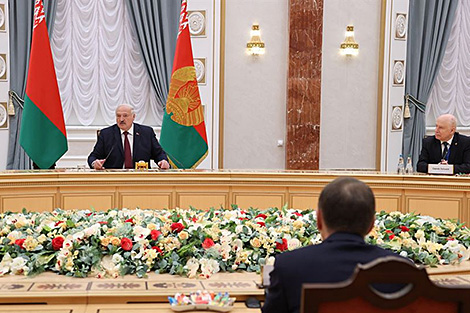
“Today we see a conflict between the West and Ukraine. The entire border is blocked. They are pursuing a brainless policy. I warned Zelensky: once another conflict starts somewhere or due to some other reason, they will forget about you. Here we go: the Middle East, the internal situation in the United States. What happened? Poor guy. He has to go around asking for money,” Aleksandr Lukashenko said.
According to the head of state, the United States had been mean towards the Ukrainian president. Foreign mass media often describe Vladimir Zelensky as insolent, but he simply wants Western partners to fulfill their promises. “Before the war they started negotiations and Americans told Zelensky: ‘You will fight to the last Ukrainian and we will finance you, supply you with weapons’. Why don’t they supply him? Why don’t they finance him? This is what he demands from them.”
The need for peace talks
The president emphasized that it was time for the parties to the conflict to come to an agreement: “Nobody needs this ugly situation. You know that today Russia is ready. And it has never refused to negotiate. Back in the day the West did not want Zelensky to negotiate. Now they point their finger at Zelensky and say ‘If he agrees to negotiate, we are also ready’. A new situation emerged and they abandoned him. Just like in Afghanistan: people will grab at the wheels [of taking off aircraft] and will drop to the airfield.”
The head of state also recalled the conflict between Vladimir Zelensky and the military. Aleksandr Lukashenko talked about the internal political situation in Ukraine during meetings with foreign and Belarusian journalists a few months ago. For example, in February the president said that peace should be negotiated primarily with the Ukrainian military.
“Ukraine’s military have a somewhat, to put it mildly, different point of view than Ukrainian politicians and President Zelensky. And Vladimir Zelensky is well aware of it. The most professional military are most convinced that the war must be stopped. You will see that we - and the Russians in the first place - will have to negotiate with the Ukrainian military all the same. People are used as cannon fodder over there, they are ready to sacrifice millions of Ukrainians. End of quote. The military understand that. And the military will be able to come to terms,” Aleksandr Lukashenko said.
Conflict resolution and the value of life
The head of state explained that he had touched upon the conflict in Ukraine for a reason: “It is easy to leave, to close the door. It will be difficult to re-connect later. Don’t do this. A lot depends on you,” he addressed the heads of the security agencies. “Indeed, we made some mistakes. Things didn’t work out in some places, for example, in Armenia, Azerbaijan. Let’s fix them.”
The president stressed that the escalation of this conflict would not have happened if the parties had listened to the advice in time and had taken the necessary measures. At the same time the head of state noted that the current Armenia Prime Minister Nikol Pashinyan should not be blamed for what had happened because he had inherited the current situation.
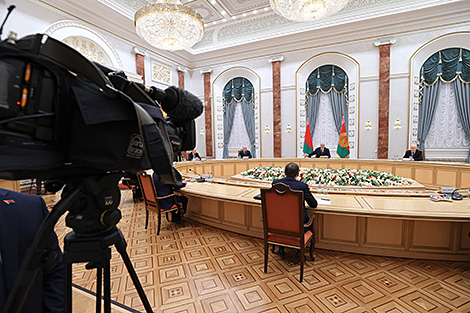
Aleksandr Lukashenko had previously called on the countries to settle things peacefully. Specific mutually acceptable measures were considered. However, the preliminary agreements were never implemented. Now it is not easy for both Armenia and Azerbaijan.
The situation at the Tajikistan-Kyrgyzstan border has historically been complicated. However, the leaders of these states managed to find a mutually acceptable solution, the president said: “I praise the leaders of the two countries all the time: they did a great job. They have agreed on more than 90% of the border. I am sure that they will sign a border agreement next year.”
“What are we fighting for? We live only once after all,” the Belarusian leader emphasized.
“You should never ever get separated. You should never leave because they will throw you under the bus. And for people in a difficult situation, at a dead end, there is only one way out: take a gun and fight,” Aleksandr Lukashenko said.


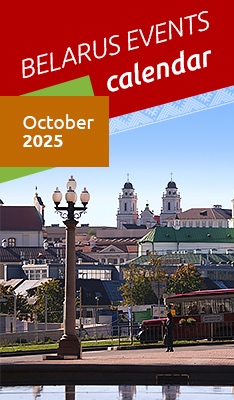




 print version
print version make home page
make home page add to bookmarks
add to bookmarks

